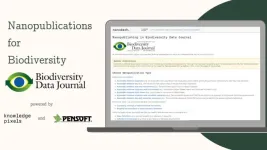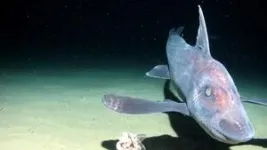(Press-News.org) Earlier this year, in a pilot project, the teams of high-tech startup Knowledge Pixels and open-access scholarly publisher and technology provider Pensoft released a novel workflow to publicly share and future-proof scientific findings by means of nanopublications.
Nanopublications complement human-created narratives of scientific knowledge with elementary, machine-actionable, simple and straightforward scientific statements that prompt sharing, finding, accessibility, citability and interoperability. By making it easier to trace individual findings back to their origin and/or follow-up updates, it also helps to better understand the provenance of biodiversity data.
These semantic statements expressed in community-agreed terms, openly available through links to controlled vocabularies, ontologies and standards, are not only freely accessible to everyone in both human-readable and machine-actionable formats, but also easy-to-digest for computer algorithms and AI-powered assistants.
Now, the collaborators - also partly supported by the Horizon 2020-funded project BiCIKL (abbreviation for Biodiversity Community Integrated Knowledge Library) - have built up on a pilot workflow already launched in the Biodiversity Data Journal - to create a specialised nanopublication solution to address the need for FAIR (Findable, Accessible, Interoperable and Reusable) data in the biodiversity science domain.
In their studies, researchers need to use and refer to extensive and diverse biodiversity data at once, e.g. information about groups of organisms and their classification, collections, authors and genetic sequences. However, those would normally be scattered across a vast number of articles or belong to dissociated databases. This is a major and widely recognised issue in biodiversity science, which is currently stagnating progress not only in building up the world’s knowledge about the natural world around us, but also impeding biodiversity conservation and ecosystem restoration.
Using the newly released nanopublication workflow, biodiversity researchers can now incorporate nanopublications within their manuscripts to future-proof their most important assertions on biological taxa and organisms or statements about associations of taxa or organisms and their environments.
In addition, the authors can also create standalone nanopublications that comment or derive from already existing research journals published in an academic journal or another citable source (e.g. expert database), regardless of the author of the source.
“With the nanopublication format, authors make sure that key scientific statements - the ones underpinning their research work - are efficiently communicated in a machine-actionable and FAIR manner. Thus, their contributions to science become future-proof for a reality driven by AI technology,”
explains Prof. Lyubomir Penev, founder and CEO at Pensoft.
“Biodiversity is the ideal field for this pilot exploring the next steps in scientific publishing. Biodiversity and its neighbouring fields have produced a remarkable number of high-quality resources, such as controlled vocabularies and databases, which we can now build upon. Moreover, many Biodiversity researchers have shown to be very open to such new methods and are enthusiastic about working together to build a more powerful ecosystem for scientific knowledge sharing, and we share their enthusiasm,”
says Tobias Kuhn, CTO and co-founder of Knowledge Pixels.
***
You can find more about the nanopublication workflow and its advantages to biodiversity scientists on the Pensoft blog and the Biodiversity Data Journal website.
***
Additional information:
About Knowledge Pixels:
Knowledge Pixels (https://knowledgepixels.com/) is a tech company that aims to kickstart the next revolution in scientific publishing and knowledge sharing. With nanopublications as its core technology, Knowledge Pixels provides software and services that make it possible to publish scientific findings in a way that is machine interpretable, open, decentralised and in full accordance with the FAIR Principles. This approach promises to make the use of research results radically more efficient and effective.
The company’s first milestone will be to develop a nanopublication-based journal environment and to test it in production with researchers, editors and publishers. Since April 2023, Knowledge Pixels has started four pilot projects with its partners IOS Press and Pensoft.
About Pensoft:
Pensoft (https://pensoft.net/) is an independent, open-access publisher and technology provider, best known for its biodiversity journals, including ZooKeys, Biodiversity Data Journal, Phytokeys, Mycokeys, One Ecosystem, Metabarcoding and Metagenomics and many others.
Over the past 30 years, Pensoft has built a reputation for its innovations in the field, after launching ZooKeys: the very first digital-first scientific journal in zoology and the first to introduce semantic enrichments and hyperlinks within a biodiversity article.
To date, the company has continuously been working on various tools and workflows designed to facilitate biodiversity data findability, accessibility, discoverability and interoperability. The latest large projects, led by Pensoft include the OpenBiodiv knowledge graph and the Horizon 2020 project BiCIKL.
END
FAIRer knowledge about biodiversity with AI-friendly nanopublications
2023-09-12
ELSE PRESS RELEASES FROM THIS DATE:
Real-world examples demonstrate how systems science can address health inequities
2023-09-12
September 12, 2023 – As researchers increasingly recognize that causes for health issues are structural and interrelated, real-world, innovative case studies demonstrate the value of applying systems science to evaluate health interventions and address health inequities as seen in a special supplement, supported by the W.K. Kellogg Foundation, in the October/December issue of Family & Community Health. The journal is published in the Lippincott portfolio by Wolters Kluwer.
Systems science offers an effective paradigm for examining and addressing various health issues to improve outcomes and reduce health inequities. The case ...
New neural insights into processing uncertainty in obsessive-compulsive disorder
2023-09-12
Philadelphia, September 12, 2023 – Obsessive-compulsive disorder (OCD) is a neurological disorder characterized by repeated behaviors such as cleaning and checking despite clear objective evidence of cleanliness, orderliness, and correctness. Although the disease is often mischaracterized as a disorder of “fussiness,” the disorder actually stems from difficulty in processing uncertainty. However, the neural underpinnings of that aberrant processing remains unknown.
Now, a new study in Biological Psychiatry: Cognitive Neuroscience and Neuroimaging, published by Elsevier, uses brain imaging to get a closer look at the underpinnings of uncertainty processing ...
15 psychological scientists receive APS’s 2024 Lifetime Achievement Award
2023-09-12
The Association for Psychological Science (APS) has awarded the 2024 APS Lifetime Achievement Awards to 15 psychological scientists whose contributions have advanced understanding of topics ranging from how to alleviate human suffering to cultural differences and similarities in mental processes. APS’s four lifetime achievement awards—the APS James McKeen Cattell Fellow Award, the APS Mentor Award, the APS William James Fellow Award, and the APS James S. Jackson Lifetime Achievement Award for Transformative Scholarship—are the association’s highest honors, and their recipients are among the field’s most accomplished and respected ...
Montefiore Einstein Comprehensive Cancer Center awarded Comprehensive Designation from the National Cancer Institute
2023-09-12
September 12, 2023—(BRONX, NY)—The newly renamed Montefiore Einstein Comprehensive Cancer Center (MECCC) has been awarded comprehensive designation by the National Cancer Institute (NCI) of the National Institutes of Health, the ultimate standard achieved by only 55 other NCI cancer centers in the U.S. Through NCI’s peer-review process, MECCC was nationally recognized for its paradigm-shifting, practice-changing, policy-impacting cancer-focused science. As a result, MECCC was awarded a five-year, $20 million Cancer Center Support Grant to advance the translation of novel cancer research into new treatments, new screening and diagnostic tools, and equitable access ...
To cut global emissions, replace meat and milk with plant-based alternatives
2023-09-12
Replacing 50% of meat and milk products with plant-based alternatives by 2050 can reduce agriculture and land use relatedgreenhouse gas (GHG) emissions by 31% and halt the degradation of forest and natural land, according to new research.
According to the study just published in Nature Communications, additional climate and biodiversity benefits could accrue from reforesting land spared from livestock production when meat and milk products are substituted by plant-based alternatives, more than doubling the climate benefits and halving future declines of ecosystem integrity by 2050. The restored area could contribute ...
Sedentary behavior and incident dementia among older adults
2023-09-12
About The Study: In this study of prospectively collected data of 49,000 adults age 60 or older participating in the UK Biobank, more time spent in sedentary behaviors was significantly associated with higher incidence of all-cause dementia. Future research is needed to determine whether the association between sedentary behavior and risk of dementia is causal.
Authors: David A. Raichlen, Ph.D., of the University of Southern California in Los Angeles, is the corresponding author.
To access the embargoed study: Visit our For The Media website at this link https://media.jamanetwork.com/
(doi:10.1001/jama.2023.15231)
Editor’s ...
Risk of brain hemorrhage appears transmissible via blood transfusion
2023-09-12
A major study published in JAMA led by researchers at Karolinska Institutet suggests that a possible cause of spontaneous brain haemorrhage could be transmitted via blood transfusion. At the same time, it is very unlikely that anyone should suffer a brain haemorrhage after receiving donated blood.
A common cause of spontaneous, recurring brain haemorrhages is the vascular disease cerebral amyloid angiopathy (CAA), in which proteins accumulate along the tiny blood vessels of the brain. Several studies have shown that CAA can be transferred from one individual ...
Use of antihypertensives, blood pressure, and estimated risk of dementia in late life
2023-09-12
About The Study: This meta-analysis including individual participant data from 34,000 older adults in 17 studies found that antihypertensive use was associated with decreased dementia risk compared with individuals with untreated hypertension through all ages in late life. Individuals with treated hypertension had no increased risk of dementia compared with healthy controls.
Authors: Matthew J. Lennon, M.D., of the University of New South Wales in Sydney, Australia is the corresponding author.
To access the embargoed study: Visit our For The Media website at this link https://media.jamanetwork.com/
(doi: 10.1001/jamanetworkopen.2023.33353)
Editor’s ...
Your body’s own cannabinoid molecules calm you during stress
2023-09-12
·Stress heightens risk for many psychiatric disorders·Finding opens new avenue for drug development to treat psychiatric disorders
·Amygdala releases endogenous cannabinoid molecules under stress
·Finding opens new avenue for drug development to treat psychiatric disorders
CHICAGO --- When you are under stress, your brain may release its own cannabinoid molecules to calm you down, activating the same brain receptors as THC derived from cannabis plants.
But the brain activity patterns and neural circuits that are regulated by these brain-derived ...
Large amounts of sedentary time linked with higher risk of dementia in older adults, study shows
2023-09-12
Adults aged 60 and older who spend more time engaging in sedentary behaviors like sitting while watching TV or driving may be at increased risk of developing dementia, according to a new study by USC and University of Arizona researchers.
Their study showed the risk of dementia significantly increases among adults who spend over 10 hours a day engaging in sedentary behaviors like sitting — a notable finding considering the average American is sedentary for about 9.5 hours each day.
The study, published on Tuesday, September 12 in ...




